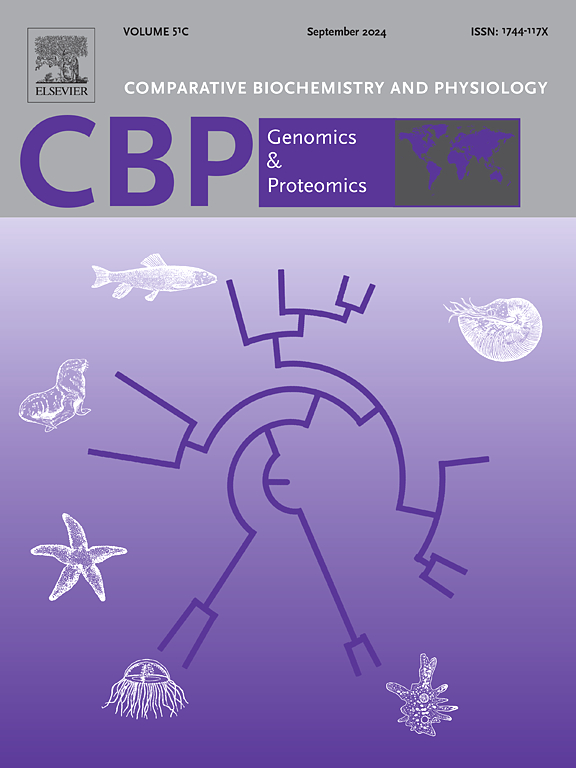Molecular responses and mechanisms of the sea cucumber Apostichopus japonicus under prolonged hypoxic conditions
IF 2.2
2区 生物学
Q4 BIOCHEMISTRY & MOLECULAR BIOLOGY
Comparative Biochemistry and Physiology D-Genomics & Proteomics
Pub Date : 2025-08-26
DOI:10.1016/j.cbd.2025.101623
引用次数: 0
Abstract
In recent decades, hypoxia has become widespread in coastal waters. Research on the molecular response mechanisms of sea cucumbers (Apostichopus japonicus) under long-term hypoxic stress is limited. Consequently, an 18-day hypoxia experiment was conducted to examine the extreme tolerance. We simulated realistic conditions by establishing dissolved oxygen (DO) levels of 2.0, 3.0, 4.0, 5.0, 6.0, and 7.0 mg/L. The results showed that chronic hypoxia had detrimental effects on respiration, survival, and weight gain of sea cucumbers. The oxygen consumption rate of A. japonicus decreased as the DO level declined (P < 0.05). Survival rates were lowest at DO levels of 2.0 and 3.0 mg/L, with survival rates of 20 ± 5 % and 45.0 ± 6.8 %, respectively. Compared to the control group, sea cucumbers at 2.0 mg/L not only exhibited a higher mortality rate, but also experienced a significant reduction in body weight (P < 0.05), with a weight gain rate of −8.75 ± 0.61 %. At the molecular level, sea cucumbers downregulate the expression of PFK and PDH in long-term hypoxia, thereby constraining energy generation via glycolysis and the tricarboxylic acid (TCA) cycle, and prompting A. japonicus to increasingly depend on augmented fatty acid β-oxidation to meet its energy requirements. Furthermore, cortisol secretion enhances carbohydrate metabolism, which in turn helps alleviate oxidative stress. Concurrently, A. japonicus increased the expression of GCL and MGST, thereby enhancing their cellular antioxidant and immune functions by regulating glutathione metabolism and other amino acids. This study enhances the understanding of the molecular mechanisms by which A. japonicus responds to prolonged hypoxia.

长时间缺氧条件下刺参的分子响应及其机制
近几十年来,缺氧在沿海水域变得普遍。对长期低氧胁迫下海参(Apostichopus japonicus)分子响应机制的研究有限。因此,进行了为期18天的缺氧实验,以检验其极端耐受性。我们通过建立溶解氧(DO)水平2.0、3.0、4.0、5.0、6.0和7.0 mg/L来模拟现实条件。结果表明,长期缺氧对海参的呼吸、生存和增重有不利影响。随着DO水平的降低,刺参的耗氧速率降低(P < 0.05)。DO浓度为2.0和3.0 mg/L时存活率最低,分别为(20±5%)和(45.0±6.8%)。与对照组相比,2.0 mg/L剂量下的海参不仅死亡率更高,而且体重显著降低(P < 0.05),增重率为−8.75±0.61%。在分子水平上,海参在长期缺氧条件下下调PFK和PDH的表达,从而抑制糖酵解和三羧酸(TCA)循环产生的能量,促使日本刺参越来越依赖于增强的脂肪酸β-氧化来满足其能量需求。此外,皮质醇的分泌增强了碳水化合物的代谢,从而有助于减轻氧化应激。同时,刺参增加GCL和MGST的表达,通过调节谷胱甘肽等氨基酸代谢,增强其细胞抗氧化和免疫功能。本研究加深了对日本刺参对长时间缺氧反应的分子机制的认识。
本文章由计算机程序翻译,如有差异,请以英文原文为准。
求助全文
约1分钟内获得全文
求助全文
来源期刊
CiteScore
5.10
自引率
3.30%
发文量
69
审稿时长
33 days
期刊介绍:
Comparative Biochemistry & Physiology (CBP) publishes papers in comparative, environmental and evolutionary physiology.
Part D: Genomics and Proteomics (CBPD), focuses on “omics” approaches to physiology, including comparative and functional genomics, metagenomics, transcriptomics, proteomics, metabolomics, and lipidomics. Most studies employ “omics” and/or system biology to test specific hypotheses about molecular and biochemical mechanisms underlying physiological responses to the environment. We encourage papers that address fundamental questions in comparative physiology and biochemistry rather than studies with a focus that is purely technical, methodological or descriptive in nature.

 求助内容:
求助内容: 应助结果提醒方式:
应助结果提醒方式:


